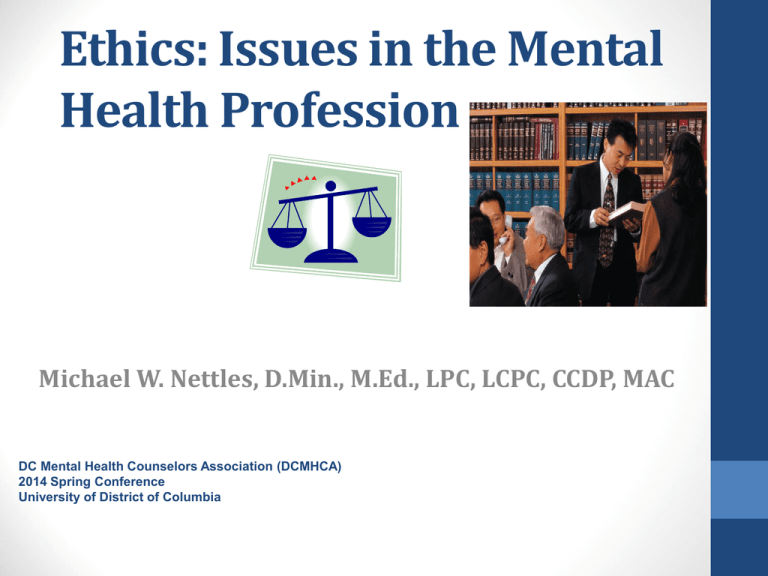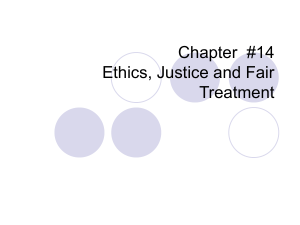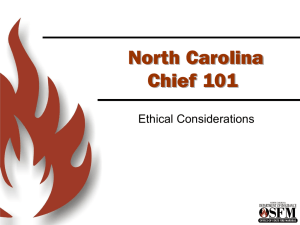
Ethics: Issues in the Mental
Health Profession
Michael W. Nettles, D.Min., M.Ed., LPC, LCPC, CCDP, MAC
DC Mental Health Counselors Association (DCMHCA)
2014 Spring Conference
University of District of Columbia
Course Description
This training is designed to allow participants to
become familiar with issues and ethics in the helping
professions.
Participants will be provided with a framework and a
direction for working through ethical dilemmas
Participants will become familiar with ethics for helping
professionals according to the AMHCA Code of Ethics
2
Ethical Codes
Ethical codes are not intended to be blueprints
for resolving every ethical dilemma; nor do they
remove all need for judgment and ethical
reasoning.
Formal ethical principles can never be
substituted for an active, deliberative, and
creative approach to meeting ethical
responsibilities (Pope & Vasquez, 2007)
3
Common Themes of Codes of Ethics
(Koocher & Keith-Spiegel, 2008)
Promoting the welfare of consumers
Practicing within the scope of one’s Competence
Doing no harm
Protecting client’s confidentiality
4
Common Themes of Codes of Ethics
Acting ethically and responsibly
Avoiding exploitation
Upholding the integrity of the profession by
striving for aspirational practice
5
Limitations of Codes of Ethics
(Herlihy& Corey, 2006a; Pope & Vasquez, 2007; Herlihy& Remley, 1995)
Simply learning the ethics codes and practice
guidelines will not necessarily make for ethical
Practice
Practitioners who belong to multiple
professional associations, licensed by their
state and hold national certifications, may be
responsible to practice within the framework of
numerous codes of ethics, yet these codes may
not be uniform
6
Limitations of Codes of Ethics
A practitioner’s personal values may
conflict with a specific standard within an
ethics code
Codes may conflict with institutional
policies and practices
Codes may not align with state laws or
regulations regarding reporting requirements
7
The AMHCA Code of Ethics
AMHCA’s Code of Ethics is intended to be a guide to do
the following:
Assist members to make sound ethical decisions
To define ethical behaviors and best practices for
association members
To support the mission of the association
To educate members, students and the public at
large regarding the ethical standards of mental health
counselors
8
The AMCHA Code of Ethics
Seven Main Sections
I. Commitments to Clients
II. Commitments to Other Professionals
III. Commitments to Students, Supervisees and
Employees
IV. Relationships
V. Commitments to Profession
VI. Commitments to Public
VII. Resolution of Problems
9
Ethics Codes and the Law
All of the codes of ethics state that practitioners are
obligated to act in accordance with relevant federal and
state statutes and government regulations
10
Ethics and Law
I. A. 2. c. Confidentiality
The release of information without consent of the
client may only take place under the most extreme
circumstances:
the protection of life (suicidality or homicidality)
child abuse, and/ or abuse of incompetent persons
elder abuse.
Above all, mental health counselors are required to comply
with state and federal statutes concerning mandated
reporting.
11
Ethics and Law
I. A. 2. d. Confidentiality
Mental health counselors make every attempt
to release only information necessary to comply
with the request or valid court order.
Mental health counselors are advised to seek legal
advice upon receiving a subpoena in order to
respond appropriately.
12
Unethical
When the word unethical is used, people think of
extreme violations of established codes. In reality, most
violations of ethics happen quite inadvertently in clinical
practice.
The best method of practice is to ask yourself,
“Is what I am doing in the best interest of my client?”
“Would my professional organization agree?”
13
Transference
The process whereby clients project onto their therapists
past feelings or attitudes they had toward significant people
in their lives.
If therapist are unaware of their own dynamics, they may
miss important therapeutic issues when they should be
helping their clients to understand and resolve the feelings
they are bringing into the present from their past.
14
Counter-Transference
15
Counter-Transference
Counter-transference is a situation in which a therapist,
during the course of therapy, develops positive or
negative feelings toward the patient.
These feelings may be the therapist's unconscious
feelings that are stirred up during therapy and directed
toward the patient..
16
Counter-Transference Issues
Being overprotective with a client
Treating clients in kind ways that goes beyond the norm
Rejecting a client
Seeing yourself in your clients
Developing sexual or romantic feelings
Developing a social relationship with clients
17
Exploitive Relationships
I.
A. 4. a., b.
a) Romantic or sexual relationships with clients are strictly
prohibited. Mental health counselors do not counsel
persons with whom they have had a previous sexual
relationship.
b) Mental health counselors are strongly discouraged from
engaging in romantic or sexual relationships with former
clients. Counselors may not enter into an intimate
relationship until five years post termination or longer as
specified by state regulations. Documentation of
supervision or consultation for exploring the risk of
exploitation is strongly encouraged.
18
Exploitive Relationships (cont’d)
1A. 4.d. Personal Values
Mental health counselors are aware of their own values,
attitudes, beliefs and behaviors, as well as how these apply in a
society with clients from diverse ethnic, social, cultural, religious,
and economic backgrounds.
Value imposition refers to counselors directly attempting to
influence a client to adopt their counselor’s values, attitudes,
and beliefs, and behaviors.
It is possible for mental health practitioners to do this either
actively or passively.
19
Value Sharing?
“Is it possible for you to disagree with a client's values and still
accept him or her as a person?”
“Is the purpose of counseling to teach values to clients or to
teach clients how to discover their own values?”
“What is the difference between exposing or imposing your
values on clients?”
“Is it ever justifiable for you to impose your values on clients?
What about those situations in which you are convince that the
client's values will result in self-destructive behavior?”
20
Role of Spiritual and Religious Values
A counselors role is not to prescribe a particular
pathway to clients in fulfilling their spiritual needs,
but to help clients clarify their own pathway.
21
Addressing Sexual Orientation
1973 the American Psychiatric Association stopped
labeling homosexuality, a sexual orientation in which
people seek emotional and sexual relationships with samegendered individuals, as a form of mental illness
1975, the American Psychological Association endorsed
this move by recommending that psychologists actively
work to remove the stigma that had been attached to
homosexuality
22
Addressing Sexual Orientation
Counselors understand that attempting to change the
sexual orientation or gender identity of LBGT clients may
be detrimental, and further, such a practice is not
supported by research and therefore should not be
undertaken
23
Confidentiality
Confidentiality I. A. 2. a.
Confidentiality is the heartbeat of relationship
building and client confidence in the counseling
process
24
Confidentiality
Confidentiality, which is rooted in a
client’s right to privacy, is at the core of
effective therapy.
“It is the counselor’s ethical duty to protect private client
communication” (Wheeler & Bertram, 2008, p.65)
Obtain and document your client’s consent before
disclosing.
Respond ethically to legal requests for disclosure
25
Duty to Warn and to Protect
Mental health professionals driven by the courts, have
come to realize that they have a dual professional
responsibility:
1. Identify those clients who are likely to do physical harm
to third parties
2. Protect third parties from those clients judged
potentially dangerous.
26
Duty to Warn
Duty to warn applies to those circumstances where case
law or statute requires the mental health professional to
make a reasonable effort to contact the identified victim
of a client’s serious threats of harm, or to notify law
enforcement of the threat.
Tarasoff
27
Duty to Protect
Duty to protect applies to situations where the
mental health professional has a legal obligation to
protect an identified third party who is being
threatened.
28
HIV/AIDS Related Issues
The HIV+ duty to protect decision is one of the more
controversial and emotion-laden issues practitioners might
encounter.
For practitioners who work with persons who are HIV+, the
choice is often between protecting the client-therapist
relationship and breaching confidentiality to protect persons at
risk of infection.
This situation can put practitioners in a moral, ethical, legal,
and professional bind.
State laws differ regarding HIV and the limits of confidentiality
and the law is often different for medical professionals than for
licensed psychotherapists.
29
HIV/AIDS Related Issues
Some states forbid any disclosure of HIV status to
third parties.
Some states allow some disclosure to at-risk third
parties by physicians and psychiatrists, but not by
other mental health professionals.
Some states prohibit psychotherapists from warning
identifiable victims of persons who are HIV-positive.
Other states have yet to address this issue by statute
30
HIV/AIDS Related Issues
Therapists need to keep current with regard to relevant
medical information related to the transmission of HIV,
know which sexual practices are safer and which are
not, and encourage their clients to practice safer sex
31
Confidentiality and HIV/AIDS Related Issues
I.A.2.n. Contagious, Life-Threatening Diseases
Mental health counselors may justify disclosing information
to identifiable third parties if clients disclose that they have a
communicable or life threatening illness.
However, prior to disclosing such information, mental health
counselors must confirm the diagnosis with a medical
provider.
The intent of clients to inform a third party about their
illness, and to engage in possible behaviors that could be
harmful to an identifiable third party, must be assessed as
part of the process of determining whether a disclosure
should be made to identifiable third parties.
32
Tarasoff Decision
California Supreme Court “1976”
A failure to warn an intended victim was professionally
irresponsible
When a therapists determines “that his patient presents
a serious danger of violence to another, he incurs an
obligation to use reasonable care to protect the intended
victim against such danger”
33
Bartering
Bartering - Exchanging goods or services in lieu of a fee
34
Bartering
I.E. 2.b. Bartering
Accepting goods or services for professional services can open the
door to misunderstandings, perceived or actual exploitation, boundary
violations, and reduced effectiveness as a clinician.
Although bartering is not prohibited by ethics or law, most legal
experts frown on the practice.
Mental health counselors usually refrain from accepting goods or
services from clients in return for counseling services because such
arrangements may create the potential for conflicts, exploitation and
distortion of the professional relationship.
However, bartering may occur if the client requests it, there is no
exploitation, and the cultural implications and other concerns of such
practice are discussed with the client and agreed upon in writing.
35
Gift Giving
When determining whether or not to accept a gift from
clients, counselors take into account the following:
The therapeutic relationship
The monetary value of a gift
The client’s motivation for the gift
The counselor’s motivation for wanting or declining
the gift
36
Steps In Making Ethical Decision Making
Identify the problem or dilemma
Identify the potential issues involved
Review the relevant ethics codes
Know the applicable laws and regulations
Obtain consultation
Consider possible and probable courses of action
Itemize the consequences of various decisions
Choose what appears to be the best course of action
(Barnett & Johnson, 2010)
37
•Vignettes
38
Counselor Responsibility and Integrity
1.C.1. a-n
Competence is both an ethical and a legal concept.
From an ethical perspective, competence is required of
practitioners if they are to protect and serve their
clients.
From a legal standpoint, incompetent practitioners are
vulnerable to malpractice suits and can be held legally
responsible in a court of law
39
Competence - 1.C.1.a-n
Even though mental health professionals may not intend
to harm client, lack of competence often is a major
contributing factor in causing harm.
Counselors practice only within the boundaries of their
competence, based on their education, training, supervised
experience, state and national professional credentials, and
appropriate professional experience.
Provide only those services and use only techniques for
which they are qualified by education, training, or
expertise.
40
Summary
Professionals are required to engage in
ongoing study, education, training, and
consultation in their areas of practice.
A practitioner’s level of competence can diminish over
time, which is a rationale for continuing education.
Failure to maintain one’s competence is considered
“practitioner decay”
41
References
American Mental Health Counselors Association,
2010
American Counselors Association, 2014
NAADAC Code of Ethics, 2011
42
AMCHA
American Mental Health Counselors Association
801 N. Fairfax Street, Ste. 304
Alexandria, VA 22314
V: 800-326-2642 F: 703-548-4775
www.amhca.org
Note: AMHCA revises its Code of Ethics every few
years, but it does not follow a predetermined schedule.
The current 2010 version will be revised within the next
several years.
43
ACA
American Counseling Association
5999 Stevenson Avenue
Alexandria, VA 22304
counseling.org • 800-422-2648 x222
Note: The 2014 ACA Code of Ethics was approved by
the Governing Council at its meeting at the ACA
conference held in Honolulu, Hawaii.
44
NAADAC
The Association for Addiction Professionals
1001 N. Fairfax Street, Suite 201
Alexandria, Virginia 22314
800.548.0497 • 703.741.7686
Fax 800.377.1136 • 703.741.7698
naadac.org.
Note: Revised March 28, 2011
45
Thank you..
Michael W. Nettles
D.Min., M.Ed., LPC, LCPC, CCDP, MAC
Community Outreach Services, Inc.
6215 Greenbelt Road, Suite 206
College Park, MD 20740
mwnettles@yahoo.com
46










